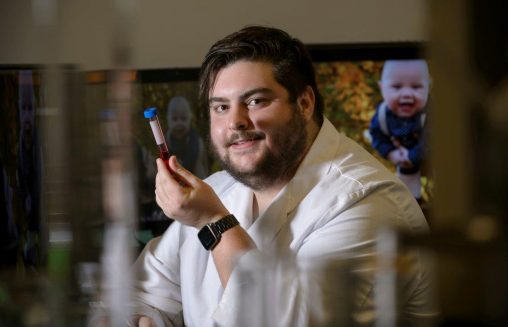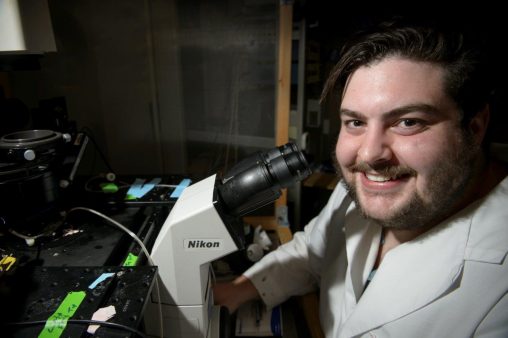
Research on respiratory physiology by Ryan Rakoczy, a physiology and neuroscience graduate student, took on a more personal meaning when his son was born prematurely. (Photos by Will Jones)
It was kind of interesting — how breathing is controlled by tiny carotid body organs that detect oxygen in the blood. For Wright State University graduate student Ryan Rakoczy, it was a curiosity that became the focus of his master’s thesis.
But then it suddenly became much, much more.
On March 9, Rakoczy’s son, Lennon, was born extremely prematurely — nearly three months early — and his underdeveloped lungs were gasping for the air needed to keep the 2-pound, 7-ounce infant alive. In fact, Lennon was immediately put on a ventilator and for the next 50 days would live in a hospital intensive care unit.
Rakoczy’s world suddenly tilted on its axis, and his research took on a whole new intensity.
“At home I’m living respiratory physiology, and at Wright State I’m working on the stuff my son’s experiencing. It’s really crazy,” he said. “I became completely obsessed with respiratory physiology.”
Rakoczy grew up in Brunswick, Ohio. He became fascinated with biology at age 9 when his mother took him to her job at the Cleveland Clinic as part of Take Your Child to Work Day. He got a behind-the-scenes peek at the labs, where one of the technicians let him pull a hair out of his own head and look at it under a microscope.
Five years later, Rakoczy’s baby sister was born mentally disabled with a genetic condition that limited her motor skills.
“That got me more interested in neuroscience,” he said. “There is a little tiny defect that causes vast changes in my sister, so how could I learn more about this?”
Rakoczy began looking for colleges with neuroscience programs and was attracted to Wright State, where he enrolled in 2008. He had his first lab experience in 2009, when he used ultrasound machines to measure the fetal development of guinea pigs. He later received his bachelor’s degree in psychology, with a concentration in behavioral neuroscience.
“I still had no idea what I wanted to do with my life,” he said.

Ryan Rakoczy hopes to develop better treatments for prematurely born infants and others with breathing ailments.
Rakoczy took a laboratory job at Miami Valley Hospital for a year and then returned to Wright State, where he enrolled in the physiology and neuroscience master’s program.
It was during a class with Christopher Wyatt, associate professor of neuroscience, cell biology and physiology, that Rakoczy learned about how breathing is controlled by tiny carotid body organs that detect oxygen in the blood. He became interested in the National Institutes of Health-funded topic and began working in Wyatt’s lab.
Rakoczy’s thesis centers on leptin, the “satiety hormone.” Made by adipose cells, leptin circulates in the blood and interacts with brain receptors to regulate energy balance by inhibiting hunger.
Wyatt’s lab found that leptin may modulate breathing by its actions on the oxygen-sensing carotid bodies.
As Rakoczy was finishing his experiments, his fiancé, Tessa, gave birth to Lennon after suffering preeclampsia, a disorder characterized by high blood pressure. After spending 50 days in Miami Valley Hospital’s neonatal intensive care unit, Lennon was transferred to Dayton Children’s Hospital, where he spent the next three weeks. He was finally able to go home but had to undergo high-oxygen therapy as his tiny lungs developed.
Meanwhile, Rakoczy continued his research on how the carotid bodies detect oxygen. Researchers theorize it might be due to the mitochrondria, which generate energy in the cells. So Rakoczy allowed rats to give birth in superoxygenated chambers and measured changes in the mitochrondria’s oxygen-sensing of their offspring’s carotid bodies.
“In working with the clinical staff, it came to my attention that respiratory therapies haven’t changed in the last 50 years,” Rakoczy said. “Premature babies are born, you put them in a box and keep them warm. Hopefully, they get better.”
Rakoczy wants to continue his research and has applied to the Ph.D. program. The research not only holds promise for developing better treatments for prematurely born infants, but also for prevention of sudden infant death syndrome, chronic obstructive pulmonary disease and sleep apnea, a disorder characterized by pauses in breathing or periods of shallow breathing during sleep.
Meanwhile, 10-month-old Lennon is now off of oxygen and weighs a healthy 18 pounds.
“Before Lennon being born, respiratory physiology was kind of a curiosity for me,” said Rakoczy. “Now I’m living it. It brings a lot more meaning to the research.”

 Wright State to expand nursing facilities to meet workforce needs and prepare more graduates for in-demand careers
Wright State to expand nursing facilities to meet workforce needs and prepare more graduates for in-demand careers  Wright State student-athletes make a lasting impact on local family with more to come
Wright State student-athletes make a lasting impact on local family with more to come  Wright State names Rajneesh Suri dean of Raj Soin College of Business
Wright State names Rajneesh Suri dean of Raj Soin College of Business  ‘Only in New York,’ born at Wright State
‘Only in New York,’ born at Wright State  Wright State president, Horizon League leaders welcome new commissioner
Wright State president, Horizon League leaders welcome new commissioner 